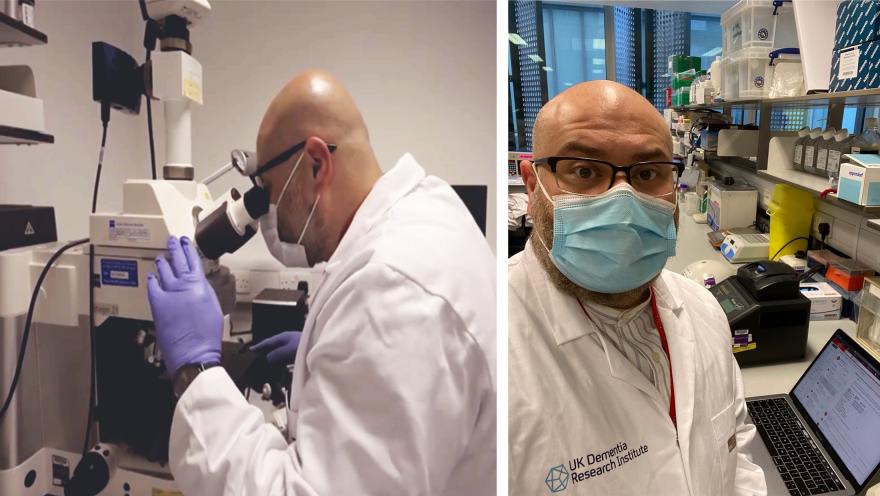It’s going to take all of us working together, doing whatever it takes, to make ALS a livable disease and ultimately find a cure. That includes researchers like our 2021 Milton Safenowitz Postdoctoral Fellowship Program recipients who are playing an important role in helping to make this happen.
The Milton Safenowitz Postdoctoral Fellowship Program continues to support young scientists and is the only program of its kind specifically funding early ALS postdoctoral fellows eagerly searching for effective treatments and a cure. Founded in memory of Mr. Safenowitz by the Safenowitz family through The ALS Association Greater New York Chapter, this unique program encourages young scientists to enter and, importantly, to remain working in the ALS field.
After completing the program, more than 75% of the postdoctoral fellows go on to start their own labs to continue studying ALS and mentor other young ALS researchers. “The Safenowitz Program is key to developing the pipeline of ALS researchers who year in and year out reinvigorate the field and help push the quest for new treatments and cures for ALS forward,” said Dr. Paul Larkin, director of research at The ALS Association.
This year, we were proud to support four new postdoctoral fellows from a highly competitive applicant pool. We are excited to highlight their dedication and unique contributions to ALS research, as well as their interests outside of the lab.
We talked with Dr. Ahmad Al Khleifat, recent winner of the distinguished ENCALS Young Investigator Award and postdoctoral fellow from King’s College London, to learn more about his research focused on disease gene identification through next generation sequencing, coupled with advanced data analysis to deliver diagnostic tools for complex disease genetics.
Can you briefly describe your academic background?
After graduating from medical school and entering neurology training, I became interested in medical research. My background as a medical doctor allows me to bring a variety of skills and knowledge to my science which allows me to understand the clinical questions that need answering and the scientific tools available to achieve that. My work and interest in neurodegeneration began during my MSc, which was conducted at the Department of Old Age Psychiatry at King’s College London, with a special focus on developing a proteomics-based biomarker for Alzheimer disease under. I did my Ph.D. with Professors Ammar Al-Chalabi and John Powell at the Maurice Wohl Clinical Neuroscience Institute, King’s College London, on the genetic characterization of ALS using whole genome sequence data and clinical phenotype data. During this period, I developed the statistical and the bioinformatics skills necessary for modern day genomics.
Why did you decide to study ALS over other diseases?
ALS is a debilitating disease and I want to find a cure for this condition.
What are the goals of your funded research project?
My two main research areas of interest are complex disease genetics research and developing strategies for delivering precision medicine in ALS and FTD. My research will focus on multiomics comparative analysis using big data to develop methods and diagnostic tools for researchers and clinicians. These will be tools for gene identification and biomarkers in affected individuals to help improve diagnostic testing, mapping disease progression and personalized healthcare in ALS and FTD.
What do you like most about working in the ALS research field?
The ALS research community, including scientists, clinicians and people living with ALS are truly special. The sense of community and the urgent need to find a cure for this condition is the driving force for our everyday mission.
How might your work impact the ALS community?
My research focuses on multiomics comparative analysis using big data to develop methods and diagnostic tools for gene identification and biomarkers in ALS to help improve diagnostic testing, mapping disease progression and personalized healthcare.
Where can people find more details about your research project?
I actively update my Twitter account (@AhmadAlKhleifat) about my research where I try to engage with fellow researchers and people with ALS. You can find an up-to-date list of publications on ResearchGate as well.
It is often said that ALS is one of the most complex diseases to understand. Yet, you go to work every day to tackle the challenges of your research. What gives you hope that there will someday be a world without ALS?
I do believe that ALS is treatable and that we can find a cure, otherwise I wouldn’t dedicate my career based on hope.
What do you like to do when you aren’t in the lab?
I am a dad to two sons (8 and 2 years old). I devote my spare time to my family where I love to cook, teach and spend quality time with them. Additionally, I am a bass guitar player and I create documentary movies, some of which were short listed for an Al Jazeera best short documentary category about underground metal music in Egypt.
Is there anything else you’d like to add?
I would like to thank The ALS Association and the Safenowitz family for investing in my research. I believe that we can find a cure for this horrible condition as soon as possible.
Stay up to date with the latest ALS research news by subscribing to our monthly newsletter, Research Matters. To learn more about the research we fund, visit als.org HERE.


Comments
My husband just recently passed due to ALS. I was his caretaker for 10 years so I know first hand what a debilitating disease this is and what suffering it causes. ALS research needs to be prioritized; both the cure, and the cause, as the cases seem to be increasing.
God bless you Dr Al Khleifat. Thank you for your compassion for those who suffer the most, and making ALS your life's work.
So sorry for your loss, Juliana.
Join the conversation. Please comment below.